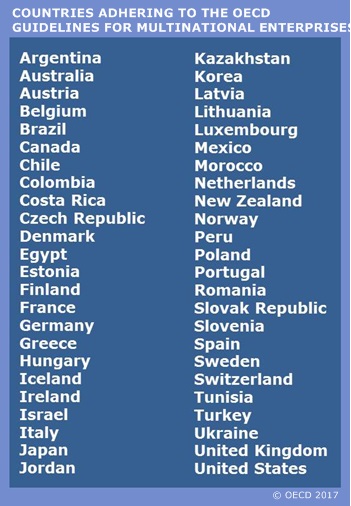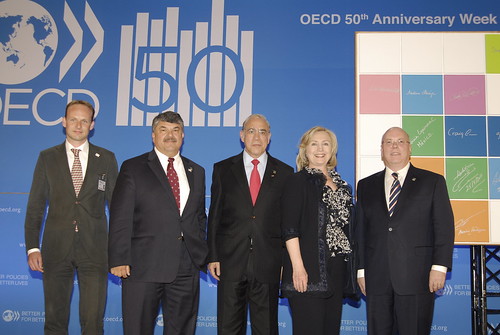About the OECD Guidelines for Multinational EnterprisesThe OECD Guidelines for Multinational Enterprises are the most comprehensive set of government-backed recommendations on responsible business conduct in existence today. The governments adhering to the Guidelines aim to encourage and maximise the positive impact MNEs can make to sustainable development and enduring social progress.The Guidelines are far-reaching recommendations addressed by governments to multinational enterprises operating in or from adhering countries. They provide voluntary principles and standards for responsible business conduct in areas such as employment and industrial relations, human rights, environment, information disclosure, combating bribery, consumer interests, science and technology, competition, and taxation. FORTY YEARS OF THE GUIDELINESThe Guidelines were first adopted in 1976 and have been reviewed 5 times since then to ensure that they remain a leading tool to promote responsible business conduct in the changing landscape of the global economy. The most recent update in 2011 took place with the active participation of business, labour, NGOs, non-adhering countries and international organisations. The Guidelines are part of the OECD Declaration and Decisions on International Investment and Multinational Enterprises. Find out more in the Guidelines brochure. |
Countries adhering to the GuidelinesAll 34 OECD countries, and 12 non-OECD countries have adhered to the Guidelines.
|
|
HOW THE GUIDELINES WORK IN PRACTICEAlthough enterprises are ultimately responsible for observing the Guidelines in their day-to-day operations, governments and stakeholders also have a vested interest in enhancing the Guidelines profile and effectiveness. In addition, governments adhering to the Guidelines have specific obligations. The role of adhering countries - Governments adhering to the Guidelines are obliged to set up National Contact Points (NCPs) whose main role is to further the effectiveness of the Guidelines by undertaking promotional activities, handling enquiries, and contributing to the resolution of issues that arise from the alleged non-observance of the Guidelines in specific instances. The Guidelines are the only government-backed international instrument on responsible business conduct with a built-in grievance mechanism. The specific instances mechanism requires NCPs to provide a platform for discussion and assistance to stakeholders to help find a resolution for issues arising from the alleged non-observance of the Guidelines. Adhering countries have flexibility in how they organise their NCPs as long as such arrangements provide an effective basis for dealing with the broad range of issues covered by the Guidelines and enable the NCP to operate in an impartial manner while maintaining an adequate level of accountability to the adhering government. To ensure that all NCPs operate in a comparable way, the concept of “functional equivalence” is used. NCPs report to and meet regularly with the OECD Investment Committee and its Working Party on Responsible Business Conduct. NCPs rely heavily on multi-stakeholder input and are committed to developing and maintaining relationships with representatives of the business community, worker organisations, NGOs and other interested parties that are able to contribute to the effective implementation of the Guidelines. The role of the Working Party on Responsible Business Conduct - The only inter-governmental body of this kind in the world, this working party of the OECD Investment Committee was inaugurated in 2013 with a mandate to assist in furthering the effectiveness of the Guidelines, fostering NCP functional equivalence, pursuing the proactive agenda, promoting engagement with non-adhering countries, partner organisations, and stakeholders, and serving as central point of information on the Guidelines. The OECD Investment Committee is the body responsible for overseeing the functioning of all elements of the Declaration on International Investment and Multinational Enterprises. The role of the OECD Secretariat - The OECD Secretariat supports the Guidelines work. It provides continuous analytical and logistical assistance to NCPs and the Working Party and serves as as central hub for Guidelines-related information to NCPs and the public at large. |
25 May 2011 - (Left /right) Joris Oldenziel, Coordinator OECD Watch; Richard Trumka, President of TUAC and the AFL-CIO, United States; Angel Gurría, Secretary-General of the OECD; Hillary Clinton, US Secretary of State and Charles P. Heeter, Jr Chairman Managing Director, Deloitte Touche Tohmatsu BIAC. Paris, France. |



